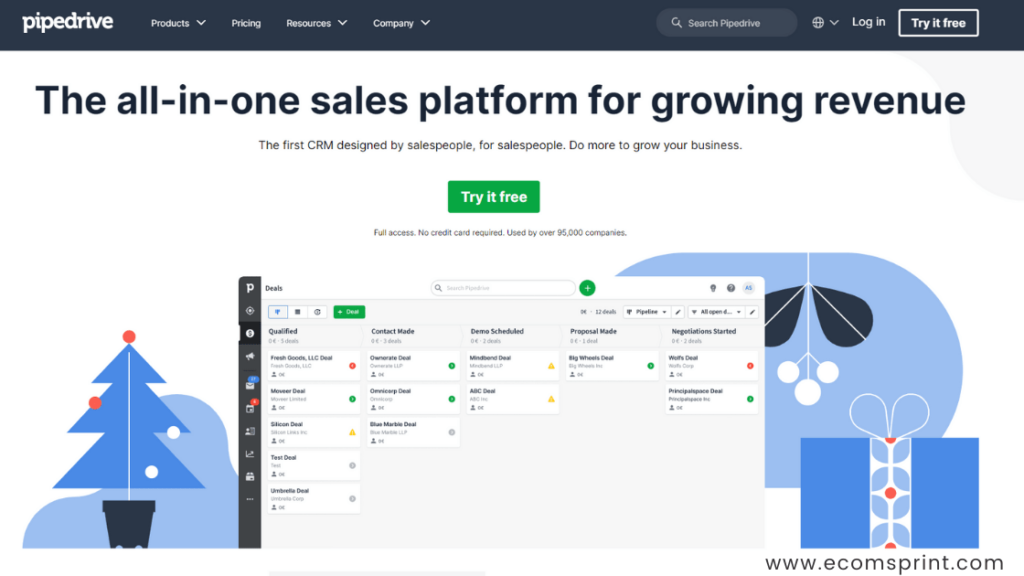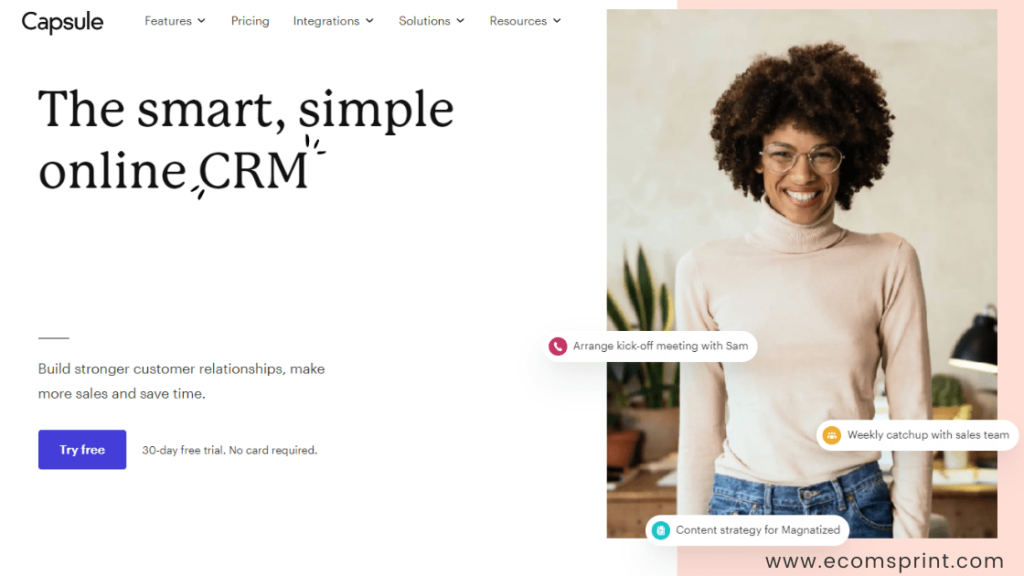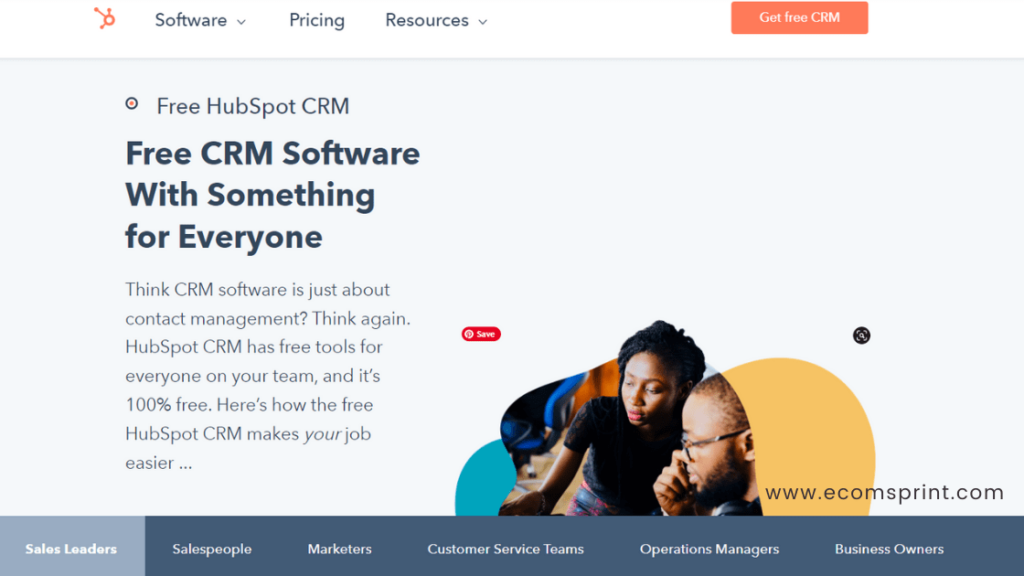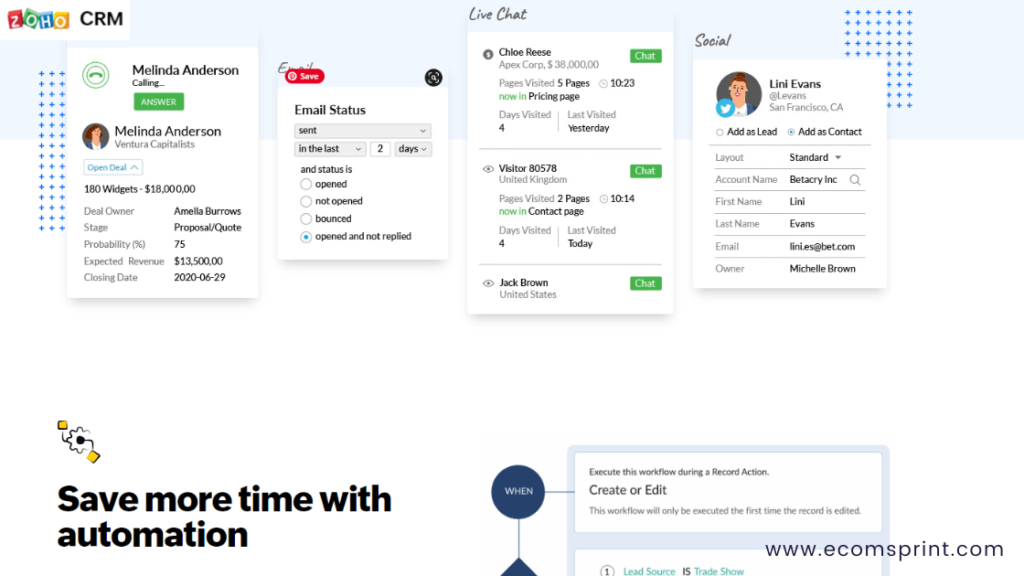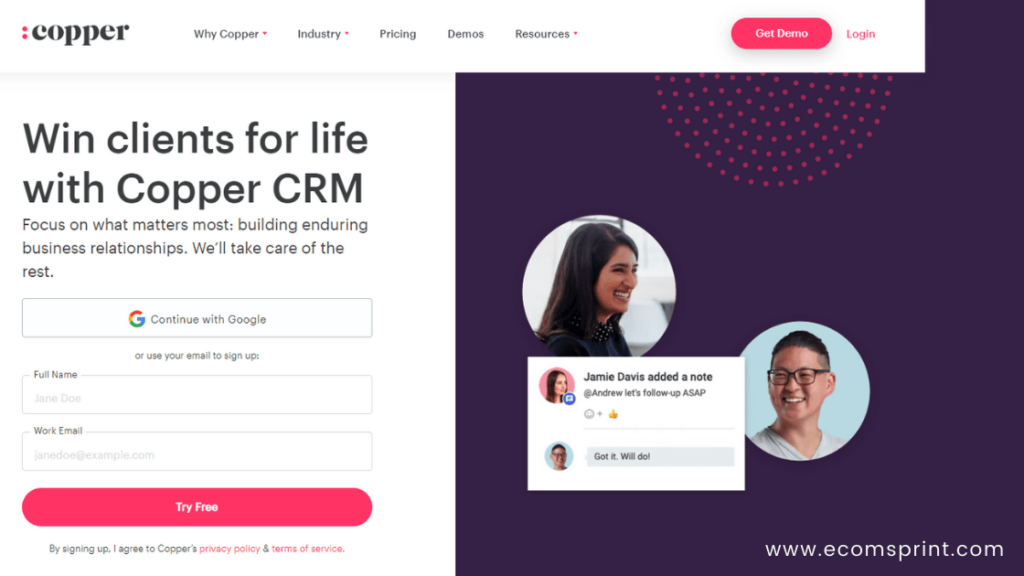Do you want to elevate your customer experience? Consider using a customer relationship management (CRM) tool. We look at the best CRM software for eCommerce available today and how to pick the best one for your needs.
It’s critical for any eCommerce business to keep track of customer relationships. Without a professional eCommerce customer relationship management system, or ECRM for short, that work becomes nearly impossible once your company reaches a certain scale.
CRMs are utilized by a wide range of businesses, including yoga instructors, SMEs, and entrepreneurs who all have an eCommerce website. What they all have in common is a desire to increase client retention, increase revenue, and capitalize on their contacts.
How do you choose from the many ecommerce CRM tools available?
In this article, I’ll quickly go through some of the best CRM software for eCommerce that top eComm businesses use to maintain track of customer interactions. I’ll give you a CRM comparison of a few popular products and highlight some of its key features so you can decide which is best for you.
CRM software for eCommerce
What is eCommerce CRM?
E-commerce CRM (short for “e-commerce customer relationship management”) is a customer relationship management system developed to assist eCommerce enterprises in managing client contact information, purchase habits, and other analytics data.
What is the purpose of eCommerce CRM software?
The best eCommerce CRM software helps you to save, organise, and utilise customer relationship data in particular ways to better your business.
What you use eCommerce CRM software for is totally up to you and your company’s objectives. You can use eCommerce CRM software to acquire information into your customers’ purchase habits, customer behaviour, and social interactions with your company. You can use this data to improve your offerings and increase your sales.
What are the different kinds of CRM?
Operational, Analytical, and Collaborative CRM are the three basic forms of CRM. Sales, marketing, and service automation are all used in operational CRMs to streamline corporate growth. Analytical CRMs are designed to collect and analyse customer data in order to improve the customer experience. Information exchange across various business units, such as sales, marketing, technical, and support teams, is made easier with collaborative CRMs.
Waht are th benefits of eCommerce CRM?
Using a CRM system for your operations has numerous benefits.
For starters, more exact and fast client tracking opens up valuable cross-selling and upselling options. The more you know about your customers’ buying habits, the greater your average order value will be.
CRM systems may appear to be expensive at first, but they will save you money and time in the long term.
Internal and external activities such as emails, invoicing, reporting, and financial forecasting are all automated in modern CRMs. Rather than performing everything manually, you can set up smart processes that are activated when you or your customers take certain actions.
Finally, using a CRM system will make your customers happier in the long run. They will feel as if they are being listened to more intently and will have a better experience as a result.
Criteria for Choosing the Best Ecommerce CRM Software
What am I searching for while we’re evaluating CRM platforms? What characteristics do CRM systems need to have? All of the CRM system examples in this article have been examined against these criteria.
The following is a list of my evaluation criteria:
Is the user interface (UI) neat and appealing? Is it simple to understand and master? Is there good tech assistance, user help, tutorials, and training at the company?
Functionality & Features:
Cross-Channel Tracking — Can the software recognise and track consumer interactions across many channels throughout the buying process?
Analytics and reporting – Embedded analytics and ad hoc reporting should be included in any CRM application.
Data Visualization — Does the programme provide a variety of alternatives for data visualisation? Can you easily manipulate the information you’ve gathered in various ways?
Analyze User Intent – Is the technology capable of analysing information about the user’s intentions? Is it simple to integrate with other tools, particularly common e-commerce solutions such as content marketing software, product lifecycle management software, and marketing software? Do you have any pre-built integrations?
Value for money: Is the pricing reasonable in relation to the features, capabilities, and use case? Is your price straightforward, transparent, and adaptable?
Top 7 CRM Software for eCommerce in 2022
Pipedrive is a CRM tool that focuses mostly on sales. One of the best features of this eCommerce CRM is that it was created with teams of different sizes in mind. In reality, this technology is used by over 90,000 firms throughout the world.
Pipedrive checks all of the boxes when it comes to ease of use for eCommerce business owners. The dashboard is simple to use yet powerful, with usability as the first focus. Whether you’re new to CRM software or have some expertise with it, we’re confident you’ll have no trouble getting to grips with it.
The pricing is simple and straightforward. For each user, prices start at $15 per month. You’ll be able to use all of the functions as a result of this. However, there is a free trial available to help you decide if this is the correct solution for you.
The functions are numerous and powerful. Territory management, quotations, and proposals are among the features you can expect, as many interfaces with marketing automation systems like Drip or Outfunnel, document storage, task management, segmentation, mobile access, leading scoring, and a calendar system.
Pipedrive is one of the most extensive, yet user-friendly, and cost-effective CRM solutions available. It could help you stay in touch with your consumers, send out intelligent email campaigns, and reengage clients who have abandoned their carts – the possibilities are unlimited.
Capsule CRM, according to its designers, is intended for enterprises with between 10 and 1,000 employees, which includes the majority of eCommerce businesses. This platform is now used by 15,000 companies around the world, indicating that it has a solid reputation.
Capsule can also be integrated with popular tools like Zapier, MailChimp, Google Data Studio, and Google G Suite, which your eCommerce store may use.
The product is available in a free edition, although it is limited, as you might anticipate. You can also take advantage of the free trial. Prices start at $18 a month, per user, if you upgrade to the paid product.
In comparison to Copper and Pipedrive, Capsule has a rather standard feature set. You’ll also notice that there are several useful tools tailored to eCommerce firms, such as sales forecasting. Source monitoring, pipeline management, lead scoring, lead distribution, interaction tracking, and much more are all part of lead management.
When it comes to eCommerce CRM systems, HubSpot is our third choice. This has been created for larger eCommerce teams who are focused on expansion and bringing their company to the next level.
Hubspot CRM has a fantastic organisational structure. You can see all of the facts about a lead in one location, allowing you to empower your employees, resulting in enhanced customer connections and productivity.
A free version is available, as well as a free trial. The price system is a little different. The CRM is free, but premium marketing automation and sales tools cost money. We recommend looking into the characteristics you require to obtain a sense of the price.
CRM has a lot of functions. This platform has all of the CRM functions stated for Pipedrive or Copper, with the exception of territory management. Project management, scheduling, quotations & proposals, forecasting, and client tracking are all covered by HubSpot. You will also have access to lead management and financial CRM.
We can’t discuss CRM systems for eCommerce without mentioning Zoho, which is one of the most popular solutions available. This is due in part to the fact that it was created to empower businesses of all sizes. It also comes with a plethora of functions.
In fact, you may develop your own custom version of Zoho CRM to ensure that it is completely matched to your requirements.
There is also a free version of this programme available, as well as a free trial. The cost of Zoho CRM starts at $12 per user, per year. There are numerous packages and features available depending on the plan you choose, as you might imagine with pricing starting at such a cheap rate.
Zoho’s eCommerce CRM features contain everything you could possibly desire or need. This includes both regular and advanced functions, such as financial forecasting and customer experience.
When you use Zoho CRM for your eCommerce business, you get a system that is incredibly expandable and easy to integrate with other Zoho products.
Copper is another CRM worth investigating. This is for small businesses who want to expand their client relationships and manage a larger quantity of sales.
eCommerce managers may simply complete activities that were previously tough with Copper CRM. One of the best features of Copper is how quickly it can be combined with your website, lead collection forms, and other common business platforms like Slack, Mailchimp, and Gmail.
The pricing is straightforward as well. It is slightly more expensive than Pipedrive, with monthly fees starting at $19 per user. Instead of a free trial, you can get a free demo of the product to see how it works.
Territory administration, bids and proposals, internal chat integration, document storage, task management, segmentation, email marketing, and a calendar system are all features that are quite comparable to Pipedrive.
Copper has a fantastic customer service department that includes in-depth materials and seminars. Copper will ensure that your learning curve is smooth and enjoyable, even if you have never used a CRM system for your eCommerce business before.
Lucrativ offers a “free sign up” option so that potential customers may see what they have to offer before committing. This includes pipeline management, connectivity, automation, analytics and insights, AI-powered CRM, and gamification tactics.

This platform excels at being a wonderful “jack-of-all-trades” solution that isn’t overburdened with features and capabilities, making it ideal for small businesses. This tool’s gamification is another distinguishing feature.
Through the Lucrativ REST API, you can integrate Gmail/Exchange mailboxes, Salesforce, Hubspot, Zapflow, and more.
Lucrativ has the fewest publicly stated third-party links on the list, which cost them a point in the Integrations section of the evaluation criterion. Their REST API gives hope, but it requires a great amount of technical knowledge to use.
Lucrativ offers a free trial and demo and starts at $50 per user every month.
Through landing pages, forms, membership sites, UTM data, email, SMS, and referral programmes, Ontraport helps you focus on lead sources that work and uncover growth opportunities. This solution, according to the CEO, was created with startups and entrepreneurs in mind.
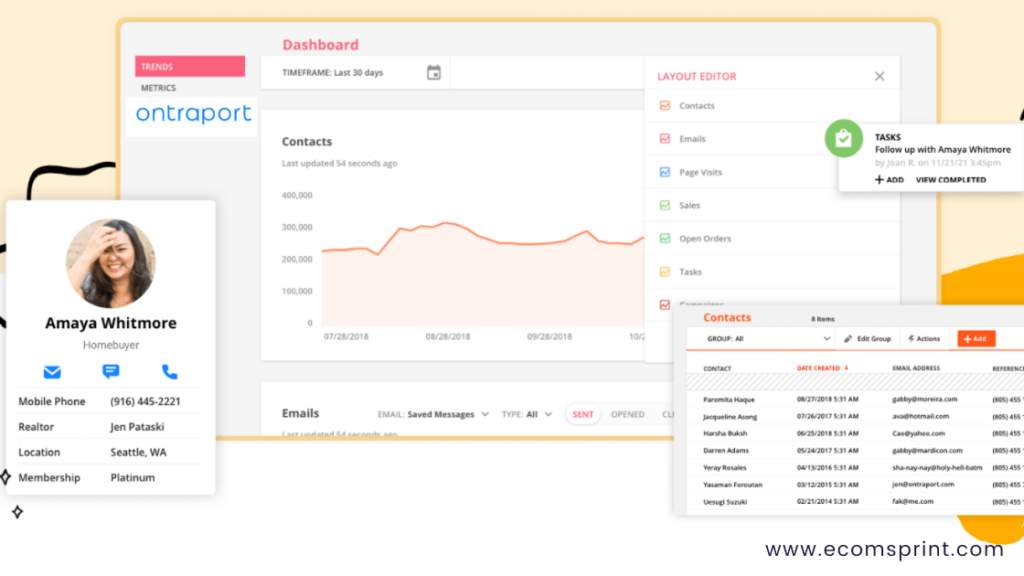
Ontraport takes the cake when it comes to robust integration options, with lists of 3rd-party apps ready for an add-on as well as a few API tools (like Zapier) to expand their connectedness even further. According to our evaluation standards, this resulted in a perfect Integrations score.
Quickbooks, XERO, Acuity Scheduling, Calendly, Google Calendar, Schedule Once, Time Trade, JotForm, PopupAlly, ConvertPlus, Bloom Form, Wufoo Forms, Freshdesk, Zendesk, Leadpages, WP Courseware, Shopify, WooCommerce, Facebook, Heyo, Viral Sweep, GoToWebinar, Zoom, and more are just a few of the Ontraport integrations. They can also use API Helpers like Zapier, Apiant, and WebMerge to expand their possibilities.
The software has a few flaws, including sloppy email campaign execution and a confusing UI that makes finding some functionality difficult.
Ontraport is available for a free 14-day trial and starts at $79 per month for 1000 users.
Choosing the best CRM Software for eCommerce
When selecting a CRM system for your eCommerce business, consider not only where you are now, but also where you want to go in 12-18 months. Setting up a CRM system requires time and work, so you must be confident that you will not outgrow your chosen platform too quickly.
Pipedrive, Copper, and Copper may be the best options for small and medium eCommerce enterprises among the options listed above. They’re simple to set up, don’t require a large upfront cost, and can scale with your company up to a point. All three CRM systems include all of the capabilities you’ll need to achieve your objectives.
Hubspot might be a better alternative if you’re running an established eCommerce firm with all of the processes in place and are trying to move up to the next level. It’s more than just a CRM because it includes a strong marketing automation and sales platform.

